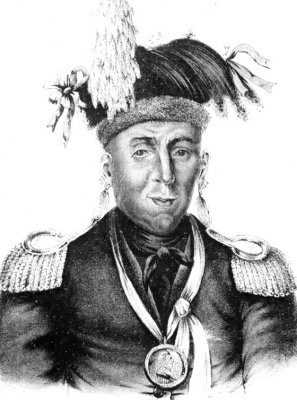Waubonsie facts for kids
Waubonsie (born around 1760 – died around 1848) was an important leader of the Potawatomi Native American people. His name has been spelled in many ways, like Wabaunsee or Waubonsee. In the Ojibwe language and Potawatomi language, his name means "He Causes Paleness" or "Break of Day."
Contents
Who Was Waubonsie?
Not much is known about Waubonsie's early life, like exactly when or where he was born. Historians believe he was born sometime between 1756 and 1765. His brother, Mucadapuckee, was also a chief. It's said that Waubonsie got his name after a brave act where he surprised some enemies and escaped at dawn.
Waubonsie and Early American Conflicts
During the time of Tecumseh's War and the War of 1812, Waubonsie supported Tecumseh and the British. They were against the expansion of American settlements. In September 1811, Waubonsie led an attack on a boat carrying supplies for William Henry Harrison's army. He bravely boarded the boat, and then quickly left before American soldiers could react. Waubonsie, along with other leaders like Shabonna and Winamac, led Potawatomi warriors against Harrison's troops at the Battle of Tippecanoe in November 1811.
Protecting Families During Conflict
Waubonsie did not agree with the attack on Fort Dearborn in 1812. He even protected the family of John Kinzie during the difficult events that followed. After the war, Waubonsie signed peace treaties with the United States. From then on, he worked hard to avoid any more fighting with the Americans. In 1827, he and other Potawatomi leaders chose not to join the Winnebago War against the Americans.
Waubonsie and the Black Hawk War
When the Black Hawk War started in 1832, Waubonsie and other Potawatomi leaders tried to keep their people out of the conflict. This was hard because many white settlers did not trust the Potawatomis. They remembered the Fort Dearborn attack and thought the Potawatomis would join Sauk leader Black Hawk's uprising.
Potawatomi leaders worried that their whole tribe would be punished if any of their people helped Black Hawk. Waubonsie and Chief Shabbona told Black Hawk they would not help him. To show their good intentions to the Americans, the Potawatomis even offered military help. They formed a group led by Billy Caldwell and Waubonsie. While they were not eager to fight, they showed support for the Americans and managed to avoid major battles.
Later Life and Legacy
After the war, Waubonsie visited Washington D.C. twice. He even met with President Andrew Jackson. He signed treaties that sold Potawatomi land in Indiana and Illinois to the United States. After this, he moved westward to Iowa. The U.S. government built Waubonsie a house near Tabor, Iowa. He passed away there in 1848 or 1849.
Some records suggest that Chief Waubonsie died from injuries in a stagecoach accident in Ohio in December 1845. This happened on his way back from Washington, D.C. Another record says he died in Booneville, Missouri, in early 1846 from his injuries.
Places Named After Waubonsie
Many places are named in honor of Chief Waubonsie:
- Waubonsie State Park, Iowa
- Wabaunsee County, Kansas
- Wabaunsee Township, Kansas
- Wabaunsee Creek, Kansas
- Lake Wabaunsee, Kansas
- Waubonsie Valley High School, Aurora, Illinois
- Waubonsee Community College, Sugar Grove, Illinois
- Wabansia Avenue, Chicago, Illinois
- Waubonsee Trail, Batavia, Illinois
The USS Waubansee (YTM-366), a United States Navy harbor tug boat, was also named for him. It was used from 1944 to 1983.


